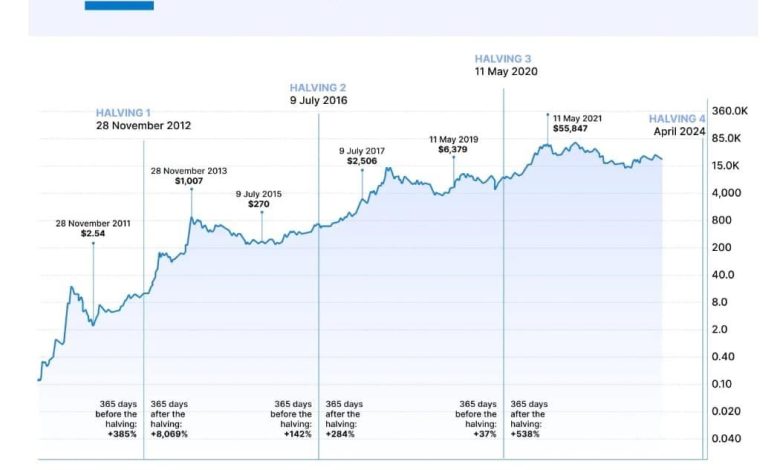Impact of Macroeconomic Events on Crypto Prices

- Understanding the relationship between macroeconomic events and crypto prices
- How government policies influence the volatility of cryptocurrencies
- The role of global economic indicators in shaping the crypto market
- Analyzing the impact of interest rates on the value of digital assets
- Inflation and its effect on the price movements of cryptocurrencies
- Geopolitical tensions and their ripple effects on the crypto industry
Understanding the relationship between macroeconomic events and crypto prices
Understanding the relationship between macroeconomic events and cryptocurrency prices is crucial for investors looking to make informed decisions in the volatile market. Various macroeconomic factors can impact the value of cryptocurrencies, leading to fluctuations in prices. By analyzing these events, investors can gain insights into how the market may react and adjust their strategies accordingly.
One key macroeconomic event that can influence cryptocurrency prices is inflation. When fiat currencies lose value due to inflation, investors may turn to cryptocurrencies as a store of value. This increased demand can drive up prices. Similarly, geopolitical events such as trade wars or political instability can lead to uncertainty in traditional markets, causing investors to seek refuge in cryptocurrencies, thus affecting their prices.
Another important factor to consider is interest rates set by central banks. Changes in interest rates can impact the cost of borrowing and the overall economy, which in turn can affect cryptocurrency prices. Additionally, economic indicators such as GDP growth, unemployment rates, and consumer spending can provide valuable insights into the health of the economy and potential impacts on cryptocurrency prices.
How government policies influence the volatility of cryptocurrencies
Government policies play a crucial role in shaping the volatility of cryptocurrencies. **Regulations** imposed by governments can have a significant impact on the prices of digital assets. For example, when a government announces stricter regulations on cryptocurrency trading or mining, it can lead to a decrease in demand and subsequently a drop in prices. On the other hand, favorable government policies such as tax incentives or **legal** recognition of cryptocurrencies can boost investor confidence and drive prices up.
Moreover, government actions in response to macroeconomic events can also influence the volatility of cryptocurrencies. For instance, during times of economic uncertainty or financial crises, governments may implement **monetary** policies that affect the value of fiat currencies. This, in turn, can lead investors to seek refuge in cryptocurrencies as a hedge against inflation or economic instability, causing prices to surge.
In addition, government decisions related to **fiscal** policies, such as stimulus packages or austerity measures, can impact the overall market sentiment towards cryptocurrencies. If a government injects a large amount of money into the economy, it could lead to inflation fears and drive investors towards digital assets like Bitcoin, which is often seen as a store of value. Conversely, austerity measures that restrict spending may dampen investor confidence and result in a decline in cryptocurrency prices.
Overall, government policies play a crucial role in shaping the volatility of cryptocurrencies. Investors should closely monitor regulatory developments and macroeconomic events to anticipate potential price fluctuations and make informed investment decisions. By staying informed and adapting to changing government policies, investors can navigate the volatile cryptocurrency market more effectively.
The role of global economic indicators in shaping the crypto market
The global economic indicators play a crucial role in influencing the cryptocurrency market. These indicators provide valuable insights into the overall health of the global economy, which in turn impacts investor sentiment and risk appetite in the crypto market. Key economic indicators such as GDP growth, inflation rates, unemployment figures, and interest rates can all have a significant impact on the prices of cryptocurrencies.
For example, a strong GDP growth rate is often seen as a positive sign for the economy, leading to increased investor confidence and potentially higher crypto prices. On the other hand, high inflation rates or rising unemployment can create uncertainty and drive investors towards safer assets, causing a decline in crypto prices.
Interest rates set by central banks also play a crucial role in shaping the crypto market. Lower interest rates can make borrowing cheaper, leading to increased investment in riskier assets like cryptocurrencies. Conversely, higher interest rates can make borrowing more expensive, dampening investor enthusiasm for crypto investments.
Overall, keeping a close eye on global economic indicators can help investors anticipate market trends and make informed decisions when trading cryptocurrencies. By understanding how these indicators influence the crypto market, investors can better navigate the volatility and capitalize on opportunities for profit.
Analyzing the impact of interest rates on the value of digital assets
Interest rates play a crucial role in determining the value of digital assets in the crypto market. When interest rates are low, investors tend to seek higher returns in alternative investments such as cryptocurrencies. This increased demand can drive up the prices of digital assets. Conversely, when interest rates rise, the cost of borrowing increases, leading to a decrease in investment in digital assets as investors seek higher returns elsewhere.
The impact of interest rates on digital assets is not limited to direct investor behavior. Changes in interest rates can also affect the overall economy, which in turn influences the value of cryptocurrencies. For example, higher interest rates can slow down economic growth, leading to a decrease in consumer spending and business investment. This can have a negative impact on the value of digital assets as investors become more risk-averse.
Moreover, central banks play a significant role in setting interest rates, which can have a direct impact on the value of digital assets. For instance, if a central bank decides to raise interest rates to combat inflation, it can lead to a decrease in the value of cryptocurrencies as investors move their funds to traditional assets with higher returns. On the other hand, if a central bank lowers interest rates to stimulate economic growth, it can result in an increase in the value of digital assets as investors seek higher returns in the crypto market.
In conclusion, interest rates are a key macroeconomic factor that can significantly influence the value of digital assets in the crypto market. Investors need to closely monitor changes in interest rates and understand how they can impact the prices of cryptocurrencies. By staying informed and adapting to changing market conditions, investors can make more informed decisions when trading digital assets.
Inflation and its effect on the price movements of cryptocurrencies
One of the key macroeconomic events that can significantly impact the price movements of cryptocurrencies is inflation. Inflation refers to the general increase in prices of goods and services in an economy over a period of time, leading to a decrease in the purchasing power of a currency. This can have a direct effect on the value of cryptocurrencies as investors may turn to digital assets as a hedge against inflation.
When inflation rises, traditional fiat currencies tend to lose value, prompting investors to seek alternative stores of value such as cryptocurrencies. This increased demand for digital assets can drive up their prices, making them an attractive investment option during times of high inflation. Additionally, some cryptocurrencies are designed to have a limited supply, which can help protect them against the devaluation caused by inflation.
However, it is essential to note that the relationship between inflation and cryptocurrency prices is not always straightforward. Factors such as market sentiment, regulatory developments, and technological advancements can also influence the value of digital assets. Therefore, while inflation can be a significant driver of crypto prices, it is essential to consider a range of factors when analyzing the market.
Geopolitical tensions and their ripple effects on the crypto industry
Geopolitical tensions have a significant impact on the cryptocurrency industry, causing ripple effects that can influence prices and market sentiment. When geopolitical events unfold, such as trade wars, political instability, or military conflicts, investors often turn to cryptocurrencies as a safe haven asset. This flight to safety can drive up demand for digital currencies, leading to an increase in their prices.
On the other hand, geopolitical tensions can also create uncertainty and volatility in the market, causing fluctuations in crypto prices. Traders may react to news of geopolitical events by buying or selling cryptocurrencies, depending on their assessment of the situation. This can lead to sudden price swings and heightened market activity.
Furthermore, geopolitical tensions can impact regulatory decisions regarding cryptocurrencies. Governments may introduce new regulations or restrictions in response to geopolitical events, affecting the legal environment for digital assets. This regulatory uncertainty can dampen investor confidence and lead to a decrease in crypto prices.



